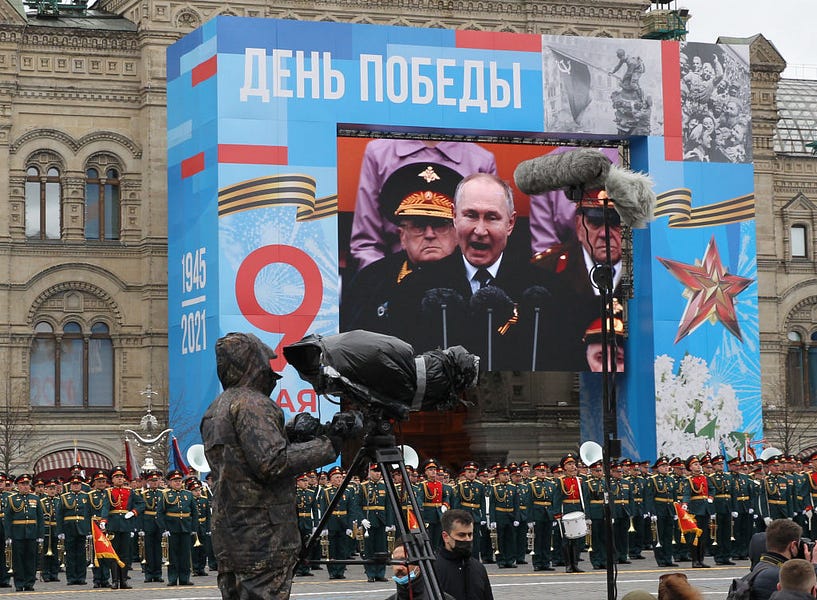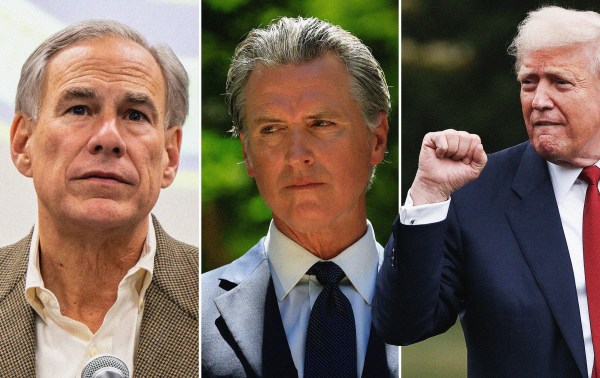On January 17, the Kremlin’s foremost political foe deboarded a plane in Moscow. Alexei Navalny—after months of recovery from his August poisoning by henchmen of Russian President Vladimir Putin—repatriated voluntarily after 20 weeks in Berlin. Navalny had few illusions about what awaited him upon his return, despite his repeated insistences that the government had no legal basis to make an arrest. Russian authorities promptly apprehended the 44-year-old politician and sentenced him to 32 months in a penal colony shortly thereafter.
“This is my home. I have come here, and people are asking, ‘Are you afraid, are you afraid?’ I am not afraid,” Navalny told a small gathering in Sheremetyevo International, where his flight was rerouted by authorities to avoid crowds of supporters and reporters amassing at southeast Moscow’s Vnukovo airport.
Despite the last-minute diversion, two Radio Free Europe/Radio Liberty (RFE/RL) journalists were there to capture it all, boarding alongside Navalny in Berlin and livestreaming his arrival in Russia. In the days following his arrest and leading up to his sentencing, traffic to the online outlet’s Russian arm climbed to a record high of more than 70 million visits and 27 million page views. RFE/RL’s coverage of Navalny ever since—including his imprisonment, hunger strike, and battle against life-threatening illness—is one of the many topics, neglected entirely by state media, driving the site’s rapid growth.
But it’s also one source of RFE/RL’s recent hardships in Russia. As Putin’s own popularity wanes, fueling the demand for independent media, the Kremlin lashes out at RFE/RL and other outlets offering unfettered reporting on the country’s leadership. The editorially independent, American-funded outlet now faces upward of $2.36 million in fines for failure to comply with Russia’s restrictive “foreign agent” laws, which Putin wields to stifle access to objective information on his home turf.
Moscow’s dismantling of RFE/RL in Russia has been a piecemeal process, which in many ways has acted as a bellwether of the country’s press freedom health in the post-Soviet era. The broadcaster, created by Congress to reach Eastern European audiences during the Cold War, entered Russia at the invitation of President Boris Yeltsin in 1991. But its fortunes quickly reversed when Putin ascended to the presidency in 2000.
According to Amnesty International’s Russia and Eurasia media manager Alexander Artemyev, taking down independent reporting “has become one of the main priorities of the authorities” over the past two decades. The fight began with the elimination or commandeering of Russia’s independent cable television channels and broadened to target print and radio in the early 2010s. In 2012, the Kremlin revoked RFE/RL’s local broadcasting license, forcing the outlet to downsize and shift coverage online.
The government mobilized “foreign agent” laws, requiring overt and lengthy warning labels on all content produced by designated foreign-financed outlets, in a final attempt to shut down free press four years ago. “Independent journalism … suffers from a lack of funding and the public’s unwillingness to support its work by donations. In fact, many media survive on foreign grants,” Artemyev told The Dispatch. “Thus, the foreign broadcasting came to the forefront of the struggle.”
RFE/RL and its affiliates were added to a list of “foreign agents,” a designation typically reserved for non-governmental organizations, in 2017. But Moscow’s enforcement of these policies began in earnest about four months ago, when Russian regulators launched a series of cases targeting RFE/RL’s noncompliance with the labeling requirement.
The outlet’s legal team has appealed more than 350 of the suits through Russia’s judicial system and filed with the European Court of Human Rights, but doesn’t expect its claims to get far in either. Authorities have already frozen RFE/RL’s bank account and initiated the process to seize its assets and technical equipment.
“Formally, they are doing what they are doing according to the law,” Andrey Shary, head of RFE/RL’s Moscow bureau, told The Dispatch. The real question, however, “is whether the law is just or not,” Shary added. “We think that the law on the basis of which we are subject to fines is not just. It’s against the Russian constitution, Russian media law, the European Convention on Human Rights, and a number of other legal documents.”
While regulations mandating that foreign-funded outlets identify themselves as such exist elsewhere, including in the United States, Russia’s heavy-handed enforcement effectively and deliberately renders independent outlets unable to operate. According to RFE/RL head Jamie Fly, the disclaimers—if properly applied—take up almost the entirety of a social media post. “That was the point where we decided that we could not comply with this Russian law,” Fly told The Dispatch, adding that the conspicuous warning labels would likely deter many readers from viewing the outlet’s content.
But perhaps even more damaging is the label’s chilling effect on reporters and freelancers working with foreign-funded media. “Our journalists are Russian nationals, they are not Americans, they are not foreigners. They are journalists who live and work in their own country, and they are reporting for their fellow citizens. So the ‘foreign agent’ label is very dangerous for any journalist in Russia, because it’s almost like branding you a spy,” Fly said. “It has the potential to scare away contributors, commentators, and even sources.”
The designation harkens back to the early days of the Soviet Union, when allegations of foreign collusion were used by the regime to silence—often through violent methods—political dissenters and reformists. “There’s a difference between the U.S.’s and Russia’s understanding of ‘foreign agent’—the term itself—because in the Russian language it’s very negative. It’s actually the equivalent of ‘spy’ or ‘enemy of the state,’” Shary explained. “People are not born to be heroes. They do have their families and their security.”
The U.S. Agency for Global Media, an independent federal agency funded by Congress, contributes nearly $125 million of the outlet’s budget to operate in 27 languages and 23 countries across Europe. But contrary to accusations from the Kremlin, RFE/RL insists that its bureaus have long functioned without editorial interference by any U.S. government officials or departments, including the White House and State Department.
This latest targeting by Moscow, the outlet argues, is driven primarily by its content, not its foreign backing. With reporters and freelancers working in localities across the country, RFE/RL sheds light on underreported issues of importance to Russian civil society. Their many regional projects include coverage of environmental issues, local corruption, health care, COVID-19, and education—“Things that affect people’s day-to-day lives, and that state media will not touch, because a lot of those issues represent topics that citizens wish the government would take care of,” Fly said.
RFE/RL’s reporting on politically sensitive topics, like nationwide anti-government protests after the imprisonment of Navalny and political repression in neighboring Belarus, has also provoked the ire of Russian officials.
“One of the reasons for the crackdown against the opposition is precisely because Putin’s own popularity has declined significantly over the last couple years, because of COVID and the economic situation in Russia,” Gary Schmitt, a resident scholar at the American Enterprise Institute, told The Dispatch. “So it’s no surprise that the radios have gained audiences in that period, and it is then—in turn—no surprise that Putin has decided that he effectively wants to take the radios down.”
And it’s unsurprising that the Russian president has identified the media as responsible for his declining approval rate, given modern Russia’s lengthy history of violence against the press. According to the Committee to Protect Journalists, at least 25 journalists have been murdered in Russia since Putin took power in 2000. Few of those deaths have been thoroughly investigated and even fewer have been prosecuted. Vladyslav Yesypenko, a reporter with RFE/RL’s Ukraine branch, was recently apprehended by Russian authorities in occupied Crimea and tortured into a false confession.
The United States has offered its rhetorical backing for the outlet during its recent plight, vowing to “unequivocally support RFE/RL and its affiliates.”
“The people of Russia deserve access to a wide range of information and opinions and a government that respects freedom of expression and keeping with Russian’s international obligations and OSCE commitments,” State Department spokeswoman Jalina Porter told reporters last month. And Secretary of State Antony Blinken promised to stand up “for the right of journalists to do their jobs” in an interview with RFE/RL on May 7.
But what concrete form that support might take remains to be seen, as the radio’s Moscow bureau prepares contingency plans to relocate its operations to neighboring states. According to Schmitt, U.S. lawmakers must also be attuned to this possibility and account for it in the congressional budget. “To keep news going into Russia, we’ll need to re-establish the radios outside of Russia, and that’s not an inexpensive affair,” he said. “Having delays in that is not going to be helpful.”
The price of RFE/RL losing access to Russia altogether is too steep, particularly as Moscow expands its assault to include other independent new outlets. In the past several weeks, the Russian Justice Ministry added the popular media sites of Meduza, VTimes, and Newsru to the list of “foreign agents.” Meduza slashed salaries, laid off staff, and launched a crowdfunding effort to stay afloat, while Newsru shuttered Monday after its advertising revenue collapsed as a result of the label.
The Kremlin’s move to uproot independent digitally based outlets, if successful, may invite autocratic governments worldwide to do the same.
“People don’t like to think of this as a return to the Cold War, but the truth is there’s always an ideological component to this—the competition between authoritarian and democratic regimes,” Schmitt said. “That’s just the nature of the beast if you’re going to deal with and compete with these regimes.”







Please note that we at The Dispatch hold ourselves, our work, and our commenters to a higher standard than other places on the internet. We welcome comments that foster genuine debate or discussion—including comments critical of us or our work—but responses that include ad hominem attacks on fellow Dispatch members or are intended to stoke fear and anger may be moderated.
With your membership, you only have the ability to comment on The Morning Dispatch articles. Consider upgrading to join the conversation everywhere.